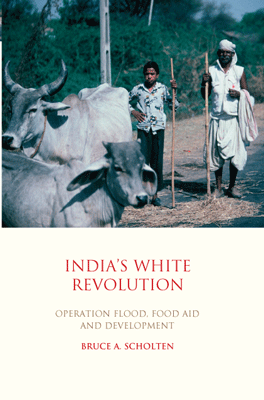Cow and Operation Flood (white revolution)
More on the book http://bit.ly/h10C8j
Why doesn't one hear of farmer suicides in Gujarat? Some would believe it is because Narendra Modi is a good Chief Minister. A less naïve explanation may have to do with Amul. The dairy cooperative procures about 10 million litres of milk daily from its 2.5 million active farmer-members, who cover ...half of Gujarat's 5 million-odd agricultural households (including those not owning land). Read the full article by Harish Damodaran here http://bit.ly/hBxzKi
Title Indias White Revolution
Subtitle Operation Flood, Food Aid and Development
Author Bruce A. Scholten
ISBN 9781848851764
List price Rs. 1995.00
Price outside India Available on Request
Original price
Binding Hardbound
No of pages 328
Book size 140 x 216 mm
Publishing year 2010
Original publisher I B Tauris & Company
Published in India by I B Tauris Special Priced Titles
Exclusive distributors Viva Books Private Limited
Sales territory India, Sri Lanka, Bangladesh, Pakistan, Nepal, .
Status In Stock
Reviews: ‘This is an extremely well-documented and innovative analysis of the dairy cooperative initiative in India and its impact on small producers. Bruce A. Scholten provides a critical understanding of the role of global-local interaction in the growth and development of this sector and the resultant contradictions. An essential reading for researchers working on India’s contemporary development scenario.’
Swapna Banerjee-Guha, Tata Institute of Social Science Mumbai, and author of Spatial Dynamics of International Capital
‘This is a fascinating and important book. Its account of Operation Flood and subsequent developments provides an important basis for understanding the modernisation of Indian agriculture – still a vital part of the country’s ever-growing economy – and yields insights into India’s relationships with its former aid donors and now trading partners. Bruce A. Scholten’s analysis of the politics of dairying in India also tells us a great deal about centre vs. state politics and the problems of steering such a vast and diverse economy into the global era of the twenty-first century.’
Peter J. Atkins, Professor of Geography, Durham University, and co-author of Food in Society
‘ This book is worth a serious look. Most publications on Operation Flood focus on minutiae, but India’s White Revolution takes long-term data to show the national-scale success of cooperative dairying in India. After finishing his initial academic research on Operation Flood, Bruce A. Scholten visited Anand. He understood that European dairy gifts could have been a Trojan Horse to neo-colonial dependence. This book shows how farmers in the Anand Pattern monetised EEC commodities to improve India’s food security. Now that the World Bank plans to replicate India’s success in Africa, the world should understand how and why it worked. The book recounts the Jha Committee Report of 1984, which stressed the importance of price incentives to stimulate village milk production to multiply consumption in a growing population.’
Verghese Kurien, Chair (retired) National Dairy Development Board, winner 1989 World Food Prize, and author of I Too Had a Dream
Description: As millions return to food poverty, and protests against economic meltdown sweep the globe, crucial lessons can be learnt by considering how farmer-controlled cooperatives improved food security in India. India’s ‘Operation Flood’ between 1970 and 1996, was the largest ever dairy aid effort by the World Food Programme and the World Bank. However, most books on Operation Flood contain outdated claims that it mimicked the mistakes of the Green Revolution, by transferring inappropriate technology to India and displacing village women’s work. Critics feared it was a ‘Trojan horse’ luring India to neocolonial dependence on EEC surpluses. Verghese Kurien, now called the Father of the White Revolution, was accused of arrogant leadership of the parastatal National Dairy Development Board based in Anand, Gujarat, far from Delhi. Some doubted the ‘Anand pattern’ was replicable outside Gujarat – however in 2008 the World Bank hailed its success and planned to replicate the low-input/low-output, environmentally-sustainable Anand Pattern in Africa.
India’s White Revolution explains how the disincentives of food aid were managed by pricing policy changes, benefiting women, children and marginal farmers, and quenching urban ‘milk famines’. FAO data show that India surpassed the USA as the world’s top milk producer in the 1990s, as milk production tripled compared to that of 1970, and per capita consumption nearly doubled as population boomed. Cooperatives returned profits from procurement, processing and marketing to farming families, and invested monetised aid in the national milk grid infrastructure to stabilise supply. Development specialists will value this book for its analysis of relatively unknown data. Students will appreciate discussion of development in the context of mercantilism, colonialism, the Cold War, Fordism, and neoliberal globalisation in the WTO era. Its politicaleconomic lessons are relevant to debates on biofuel, intellectual property, poverty and private investment in poor countries. Bruce A. Scholten provides a dramatic narrative of an era when India’s farmers seized the double-edged sword of food aid.Contents: After the Deluge : Why Operation Flood requires a summing up • Recurring Depression? Free trade in goods, services and capital too? • Mercantilism to WTO: Why rich & poor drop protection for tariffication • Food & Dairy Aid: Post-war effects on poverty & development • Data on India & Comparators: Beyond expectations 1960s - 1990s • Three Phases of Flood: OF-I, OF-II, OF-III win the White Revolution • Index
About the Author: Bruce A. Scholten is Honorary Research Fellow in the Department of Geography, Durham University. He has written on agricultural policy for a variety of international publications and his current research focus is the political economy of food. He grew up on a dairy farm near Lynden, Washington, USA.
Target Audience : Researchers of development studies, policy makers, co-operative boards.


No comments:
Post a Comment